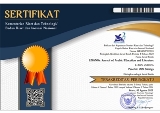Istikhdām an-Naẓariyyah al-Mujażżarah li Strauss fī al-Buḥūṡwa ad-Dirāsāt al-‘Arabiyyah
Abstract
There are several theories in qualitative research including Grounded Theory (GT). It is a theory discovered, developed, and achieved by collecting and analyzing data systematically about specific phenomena. it is the result of a study called grounded Research (GR). The purpose of this study is to present the role of Strauss's Grounded research in Arabic research (PBA) and the types of GT produced. This study uses qualitative-descriptive research, with primary data sources from PBA that have been published in the last five years, namely 15 topics. The results of this study indicate that the roles of GR in PBA as a type of qualitative research are 5 topics, as a qualitative approach are 8 topics, as a qualitative method is 1 topic, and as a qualitative technique is 1 topic. In general, the role of GR is as an approach in qualitative research. The types of GT are 10 topics in the form of theory, 2 topics in the form of hypothesis, and 3 topics are in the form of assumptions. In general, the result of GR is GT in the form of theory.
Keywords
Full Text:
PDFReferences
Acharya, A. (2004). Google Cendekia: Bibliographic Database. Retrieved February 10, 2020, from Google Scholars website: https://scholar.google.co.id/schhp?hl=id
Ainin, M. (2007). Metodologi Penelitian Bahasa Arab (A. N. AR, Ed.). Pasuruan: Hilal Pustaka.
Al-Sahafi, M. (2015). The Role of Arab Fathers in Heritage Language Maintenance in New Zealand. International Journal of English Linguistics, 5(1), 73–83. https://doi.org/10.5539/ijel.v5n1p73
Al-Wreikat, A., Rafferty, P., & Foster, A. (2015). Cross-language information seeking behaviour English vs Arabic. Library Review, 64(6–7), 446–467. https://doi.org/10.1108/LR-04-2015-0044
Alrabah, S., Wu, S., Alotaibi, A. M., & Aldaihani, H. A. (2016). English Teachers’ Use of Learners’ L1 (Arabic) in College Classrooms in Kuwait. English Language Teaching, 9(1), 1–11. https://doi.org/10.5539/elt.v9n1p1
Anselm L. Strauss Fund. (1996). ANSELM L. STRAUSS. Retrieved February 2, 2020, from Anselm Strauss website: http://dne2.ucsf.edu/public/anselmstrauss/index.html
Arnod, B. I. A. (2020). جودة البحث العلمي: المعايير، المتطلبات، المعوقات، والإجراءات التطويرية من وجهة نظر الباحثين (دراسة نوعية باستخدام النظرية المجذرة). المجلة التربوية جامعة الزقازق, 69, 1–27.
Azahari, A. R. (2016). Kendala Pelestarian Olahraga Masyarakat Sebagai Material Culture pada Generasi Muda Perkotaan: A Grounded Research. CENDEKIA, 10(2), 207–216. https://doi.org/10.2307/j.ctv47w9wm.18
Bukhori. (2019). Pendekatan multikultural dalam pengajaran bahasa arab di pesantren. Kelola; Jurnal Ilmu Sosial, 2(2), 108–128.
Bungin, M. B. (2007). Penelitian Kualitatif-Komunikasi, Ekonomi, Kebijakan Publik, dan Ilmu Sosial Lainnya. Jakarta: Kencana.
Creswell, J. W. (2009). Research Design; Qualitative, Quantitative, and Mixed Methods Approaches. USA: Sage Publications.
Fatoni, A. (2019). Peran Motivasi Belajar Bahasa Arab terhadap Aktivitas Pembelajaran: Studi Kasus Mahasiswa PBA Universitas Muhammadiyah Malang. El-Tsaqafah; Jurnal Jurusan PBA, 18(2), 183–202.
Foley, G., & Timonen, V. (2015). Using Grounded Theory Method to Capture and Analyze Health Care Experiences. HSR; Health Services Research, 50(4), 1195–1210. Retrieved from https://doi.org/10.1111/1475-6773.12275
Glaser, B. G., & Strauss, A. L. (1967). The Discovery of Grounded Theory - Strategies for Qualitative Research. USA: Aldine Transaction.
Hanani, N. (2016). Efektivitas Penggunaan Metode Audiolingual Dalam Pembelajaran Bahasa Arab. Realita; Jurnal Penelitian Dan Kebudayaan Islam, 14(2), 246–256.
Harris, T. (2015). Grounded theory. Nursing Standard, 29, 1–19.
Hutagalung, T. B., & Utomo, D. C. (2017). Meta-Analisis Variasi Penelitian dari Peneliti Akuntansi di Indonesia. Diponegoro Journal of Accounting, 6(4), 1–11.
Irhamni. (2019). Strategi penerjemahan yang digunakan mahasiswa jsa dalam menerjemahkan teks arab ke dalam bahasa indonesia. Konferensi Nasional Bahasa Arab V, 64–72. Malang: UM Press.
Irhamni, & Ma’sum, A. (2015). Post Bearded Translation Method (Post Terjemahan Jenggotan) Hasil Rekayasa K.H. Muhammad Syadzali dalam Pembelajaran Penerjemahan Al-Qur’an di Pesantren Nur Huda Al-Barokah Pakisaji Malang. Konferensi Nasional Bahasa Arab I, 144–159. Malang: UM Press.
Lessor, R. (2000). Introduction : Anselm Strauss’ Grounded Theory and the Study of Work. Sociological Perspectives, 43(4), 1–5.
M. Alammar, F., Intezari, A., Cardow, A., & J. Pauleen, D. (2019). Grounded Theory in Practice: Novice Researchers’ Choice Between Straussian and Glaserian. Journal of Management Inquiry, 28(2), 228–245. https://doi.org/10.1177/1056492618770743
Mahmud, B. (2018). نحو علوم اجتماعية في السياق العربي Towards Social Sciences in the Arab Context : The Need for Grounded Theory. عمران (Omran), 26(7), 85–112.
Mahmudah, A. R., & Hariyah, H. (2016). Pengalaman Mahasiswa Dalam Melakukan Wirausaha Informasi: Sebuah Penelitian Grounded Theory. Baca: Jurnal Dokumentasi Dan Informasi, 37(2), 121–135. https://doi.org/10.14203/jurnalbaca.v37i2.239
Maupa, H. (2017). Riset marketing: pendekatan grounded theory. Prosiding Seminar Nasional ASBIS, 384–396. Banjarmasin: Politeknik Banjarmasin.
Medaglia, R., & Zheng, L. (2016). Characterizing government social media research: Towards a grounded overview model. Proceedings of the Annual Hawaii International Conference on System Sciences, 2991–2999. https://doi.org/10.1109/HICSS.2016.375
Mirza, G., Fakhruddin, Y., & Salamah, Y. (2016). مقدمة في مناهج البحث العلمي الاجتماعي. Republic Institute for Scientific Research.
Mohammed, S. M. A. (2019). الاحتياجات التربوية للمرأة في الريف المصري: دراسة حالة باستخدام منهجية النظرية المجذرة. المجلة التربوية جامعة الفيوم, 62, 280–345.
Muhadjir, N. (2002). Metodologi Penelitian Kualitatif Edisi IV. Yogyakarta: Rake Sarasin.
Muharromah, I., Basir, U. P. M., & Raharjo, R. P. (2019). Model Alih Kode dan Campur Kode dalam Pembelajaran Bahasa Arab di Kelas 1 Pada Pondok Pesantren Putri Walisongo Cukir Jombang. Jurnal Ilmu Pengetahuan; Discovery, 04(02), 1–15.
Nurcholis, A. (2015). Kontekstualisasi Manajemen Program Intensive Course Bahasa Arab di IAIN Tulungagung. Konferensi Nasional Bahasa Arab I, 64–78. Malang: UM Press.
Prastomo, A. (2014). Sistem Informasi Pelayanan Jasa Perbaikan Peralatan Elektronik CV Sumber Teknik Cool. Faktor Exacta, 7(4), 305–316. Retrieved from journal.lppmunindra.ac.id/index.php/Faktor_Exacta/article/viewFile/286/272
Rahardjo, M. (2011). Memahami ( Sekali Lagi ) Grounded Research. Malang.
Rahman, H. N., Budiwahyono, E., & Daryus, A. (2017). Model Penerapan Difusi Energi Terbarukan untuk Peningkatan Adopsi dengan Menggunakan Grounded Theory dan Soft Operation Research : Kasus Universitas Darma Persada. Prosiding Seminar Nasional XII “Rekayasa Teknologi Industri Dan Informasi, 12, 268–274.
Redman-MacLaren, M., & Mills, J. (2015). Transformational grounded theory: Theory, voice, and action. International Journal of Qualitative Methods, 14(3), 1–12. https://doi.org/10.1177/160940691501400301
Sorokin, P. (1947). Society, Culture, and Personality. New York: Harper & Row.
Strauss, A., & Corbin, J. (1990). Basic of Qualitative Research; Grounded Theory, Prosedures, and Techniques. California: Sage Publications.
Strauss, A., & Corbin, J. (1999). أساسيات البحث الكيفي؛ أساليب وإجراءات النظرية المجذرة (A. bin H. Al-Khalifah, Ed.). Riyadh: Universitas Islam Imam Muhammad bin Saud.
Subu, M. A., Waluyo, I., Nurdin, A. E., Priscilla, V., & Aprina, T. (2018). Stigma, Stigmatisasi, Perilaku Kekerasan dan Ketakutan diantara Orang dengan Gangguan Jiwa (ODGJ) di Indonesia: Penelitian Constructivist Grounded theory. Jurnal Kedokteran Brawijaya, 30(1), 53–60. https://doi.org/10.21776/ub.jkb.2018.030.01.10
Sudira, P. (2009). Studi Mandiri Grounded Theory. Yogyakarta: UNY.
Syathybie, A., & Sauri, S. (2017). Pengembangan Materi Pembelajaran Gramatika Bahasa Arab (Nahwu) di Pesantren Bayt Tamyiz Indramayu. Ta’dibuna; Jurnal Pedidikan Islam, 6(2), 151–168.
Tamsah, H., Ilyas, G. B., Nur, Y., & Farida, U. (2019). The Resilience of Poor Families and Their Effects on Poverty : A Grounded Research Approach. IOSR Journal of Business and Management (IOSR-JBM), 21(6), 1–5. https://doi.org/10.9790/487X-2106050105
Unsi, B. T. (2016). Pembelajaran Bahasa Arab Melalui Pendekatan Komunikatif (Studi Kasus di Pondok Pesantren Al-Munawaroh Ngemplak Ngudirejo Diwek Jombang). Tafáqquh: Jurnal Penelitian Dan Kajian Keislaman, 4(1), 57–77.
Wahab, M. A. (2015). Formulasi Konsep Tenses dalam Bahasa Arab Kontemporer (Analisis Linguistik terhadap Pemikiran Nahwu Tammâm Hassân). Artikel UIN JKT, 1–21.
Walidin, W., Saifullah, & Tabrani. (2015). METODOLOGI PENELITIAN KUALITATIF & GROUNDED THEORY. Banda Aceh: FTK Ar-Raniry Press.
Walsh, I., Holton, J. A., Bailyn, L., Fernandez, W., Levina, N., & Glaser, B. (2015). What Grounded Theory Is…A Critically Reflective Conversation Among Scholars. Organizational Research Methods, 18(4), 581–599. https://doi.org/10.1177/1094428114565028
Wekke, I. S. (2015). Arabic Teaching and Learning: A Model from Indonesian Muslim Minority. Procedia - Social and Behavioral Sciences, 191, 286–290. https://doi.org/10.1016/j.sbspro.2015.04.236
Yusuf, M., & Wekke, I. S. (2015). Active Learning on Teaching Arabic for Special Purpose in Indonesian Pesantren. Procedia - Social and Behavioral Sciences, 191, 137–141. https://doi.org/10.1016/j.sbspro.2015.04.245
DOI: https://doi.org/10.18326/lisania.v4i1.65-79
Refbacks
- There are currently no refbacks.
Copyright (c) 2020
View My Stats







